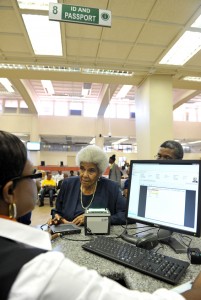Frustration with the department of home affairs is bound to increase as immigrants and migrant workers grapple with stricter immigration laws. AAISHA DADI PATEL set out to find out how people moving to South Africa for work or marriage have fared when dealing with Home Affairs.
Earlier this month 900 immigrants filed an application to force the Department of Home Affairs to do its job after claims that the department had failed to process various applications within a reasonable time period.
Shameena Ghumra, originally from Zambia, was lucky. She didn’t have to deal with the department herself, opting instead to have an agency manage her paperwork. Ghumra said she was asked for a list of documents and the agency then took over the entire process, updating her regularly. Ghumra got her permit after two or three months. “Because [the agency] did all the hard work with Home Affairs, I was blessed not have had to deal with [the department],†she said.
But it isn’t smooth sailing for everyone.
Zimbabwean Salma Seedat moved to Cape Town after marrying a South African in 2003. Her applications for a work permit, and then permanent residency, were drawn out and frustrating, with a lot of back-and-forth and waiting.
“The overall experience was really unpleasant. The counter staff were rude, unhelpful and uncaring.†And although Seedat could apply for citizenship after five years of marriage, she put the application off until 2012 to avoid the administrative nightmare. By that time, she said, the processes were much smoother.
“We were served within 15 minutes; the forms were filled in, copied, stamped, and I was asked to take them downstairs to take fingerprints and pay a fee of R300. We completed that process within 10 minutes [and] were done within an hour.â€

“Right now I’m still waiting for my visa to be sorted out. I call them fortnightly. I have not been able to do anything almost for four years now. Luckily I am involved with Herbalife and that is how I make my money because there is no requirement of a visa for it,†she said.
British-born Kait Laing, who is based in Cape Town, found Home Affairs to be helpful and professional in all ways – except for the time taken to get her visa back. This process took six months.
“Home Affairs is not clear about this on their website or communications, probably because this exposes the civil service and the minister to how they are not meeting their performance targets,†she said
Laing’s application took 45 days to get to Pretoria. Because the help line was not specific in about the status of her application at each stage, she began to panic. The application returned to Cape Town after 85 days but she was told that she couldn’t collect it until she received an SMS.
“I never actually received an SMS, but the online tracker finally indicated it was ready for collection. 120 days after submission, I had my visa outcome in hand,†she said.
“If Home Affairs don’t even know where applications are in their building, how do they know where immigrants who may be in breach of immigration rules are?â€
German engineer Felix Faulhauber married a South African in 2010 but Home Affairs officials told him they did not believe his marriage was legitimate, and asked to interview him about their relationship.
He applied for a work permit straight after his marriage in January 2010 so that he would be able to apply for permanent residency as soon as possible. Faulhauber received his work permit seven months later, after many hassles with Home Affairs officials who, he said, implied several times that a bribe would speed up the process. When he eventually received it, he was surprised to find that it came in the form of a handwritten sticker.
“My immediate reaction was that it looked fake. The validity was one year and 11 months, versus the three or five years I heard are standard, and coincidentally just short of the two years I needed before I could apply for permanent residency,†he said.
Further complications arose when he tried to apply for permanent residency, without which he could not secure loans in order to buy a home or a car. Frustrated with the process, he and his wife opted instead to move to the US, where they were soon approved as permanent residents through an immigration process that was “incomparably easierâ€.
For some though, the situation is so bad that they believe a bribe is the only way to resolve matters.
A Malawian man, who spoke on the condition of anonymity, said he found a simple solution to his immigration problems.
“I approached a Home Affairs branch and someone offered to organise a South African passport for me for R2000. Within a year of coming to South Africa, I am now a South African citizen,†he said.

![Malusi Gigaba [gcis]](https://www.thedailyvox.co.za/wp-content/uploads/2014/07/Malusi-Gigaba-gcis.jpg)







